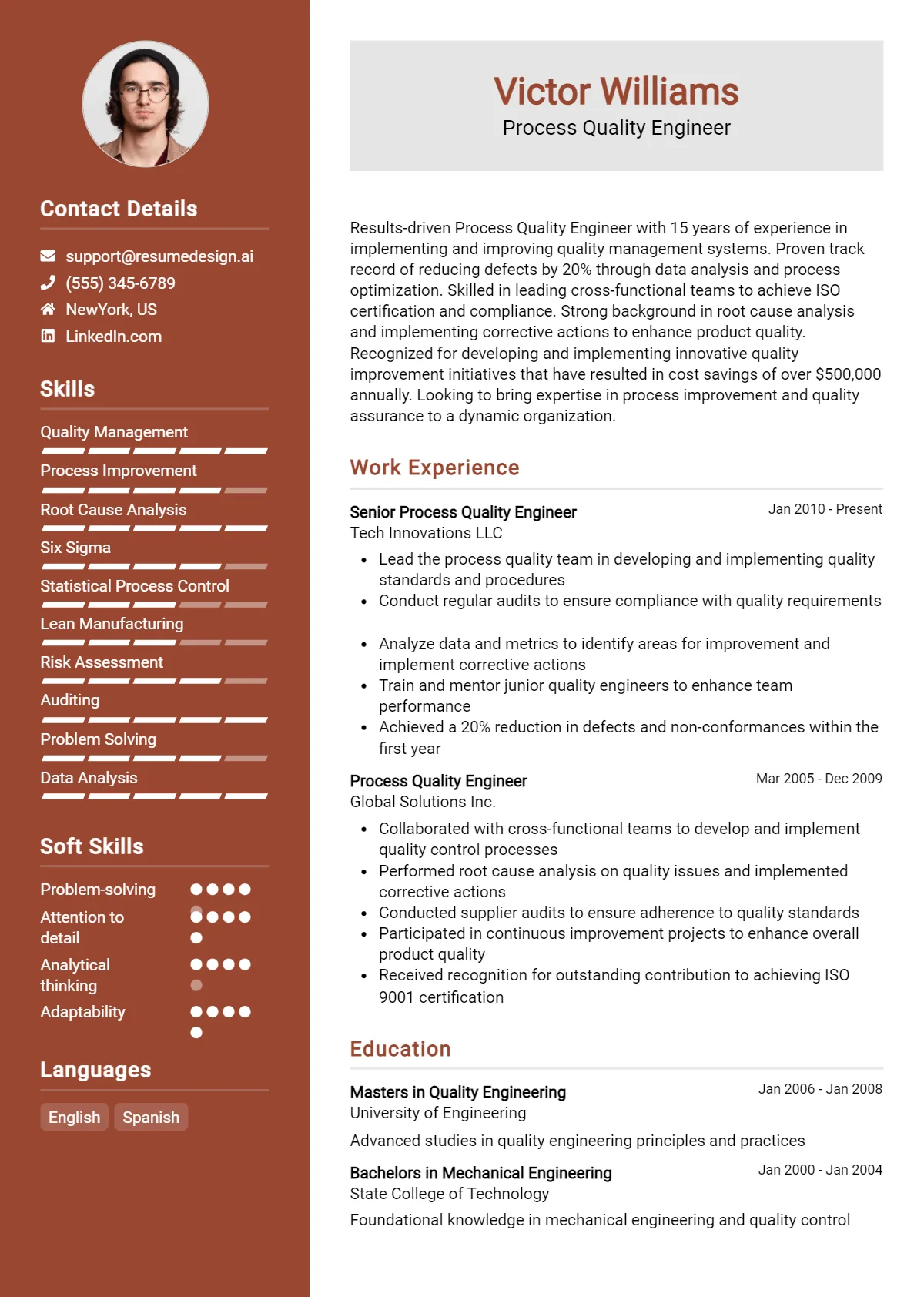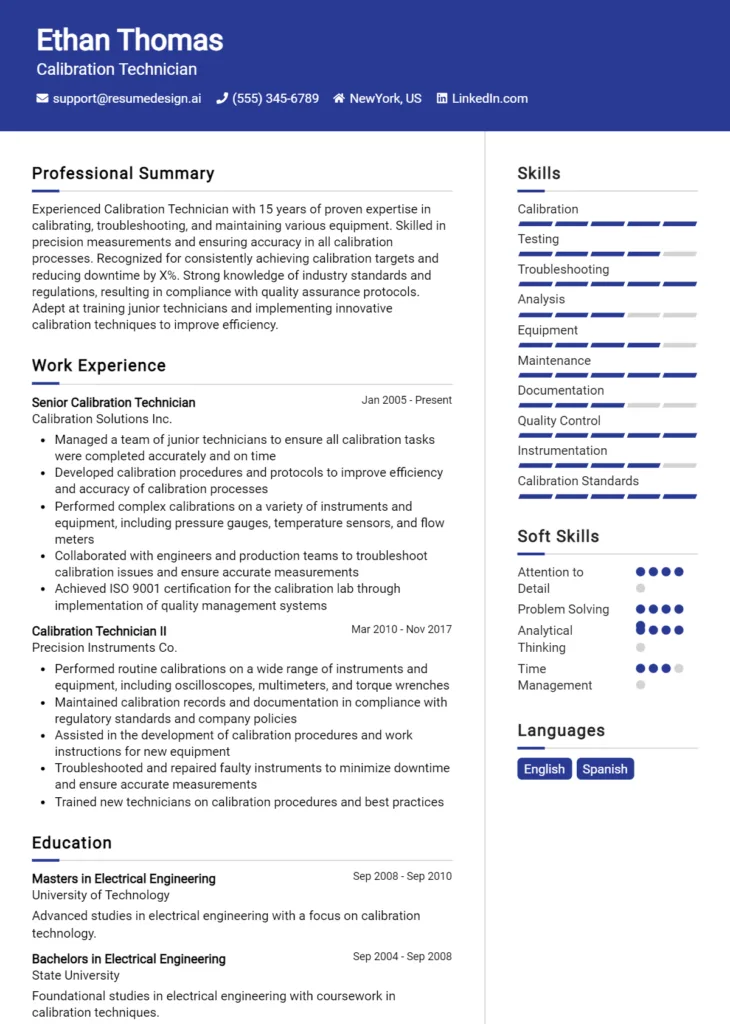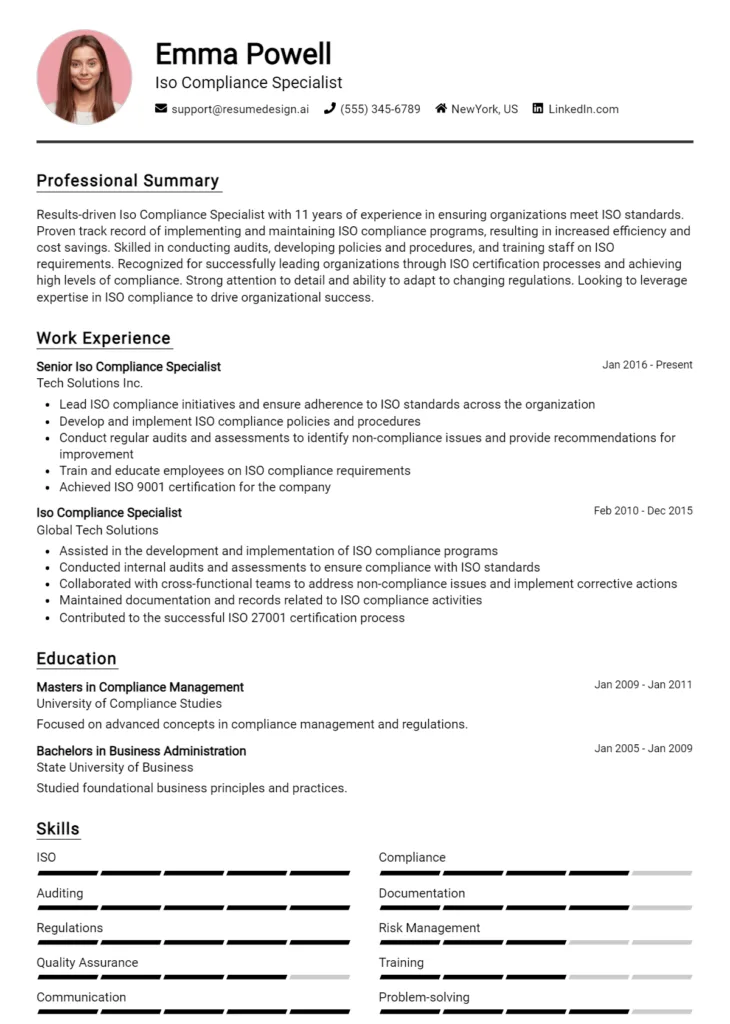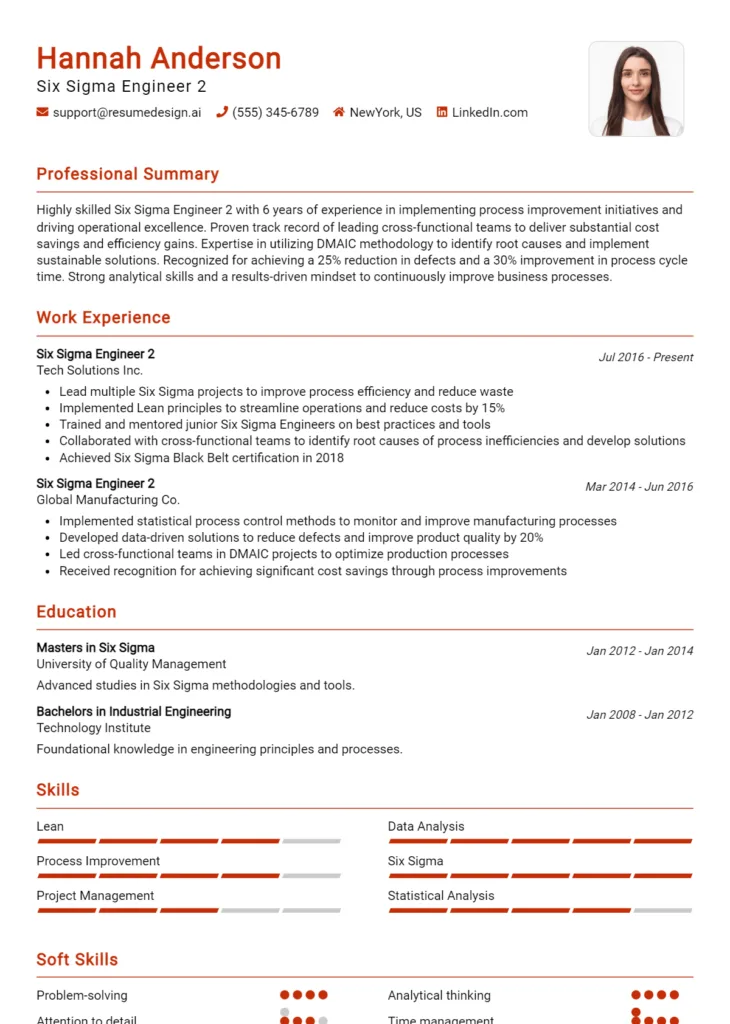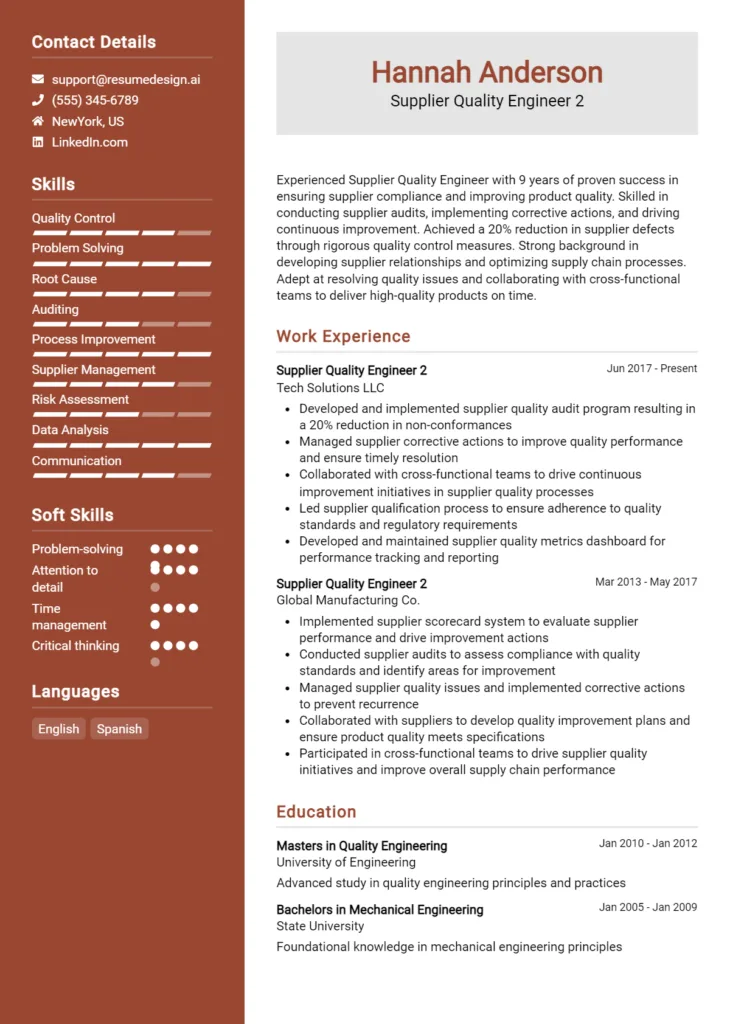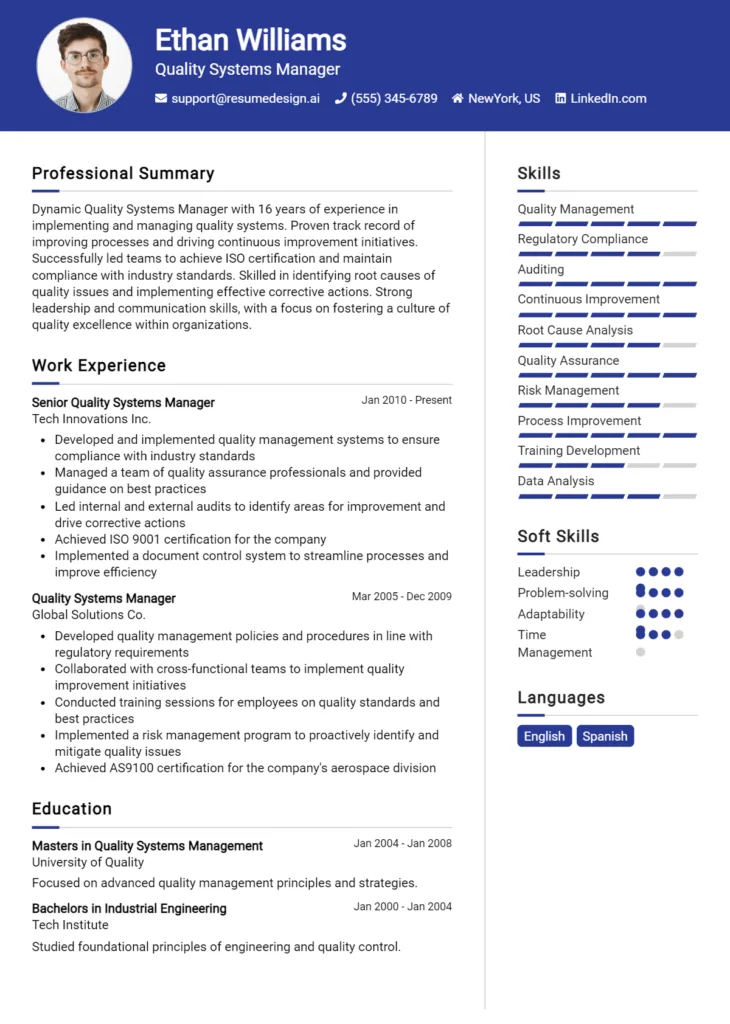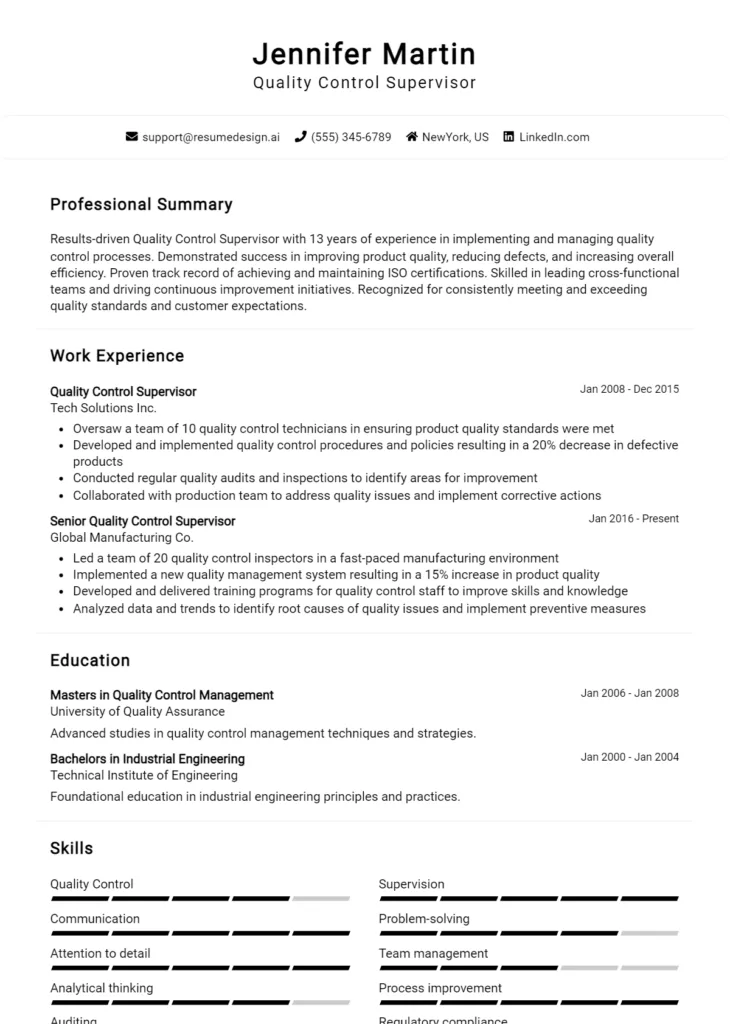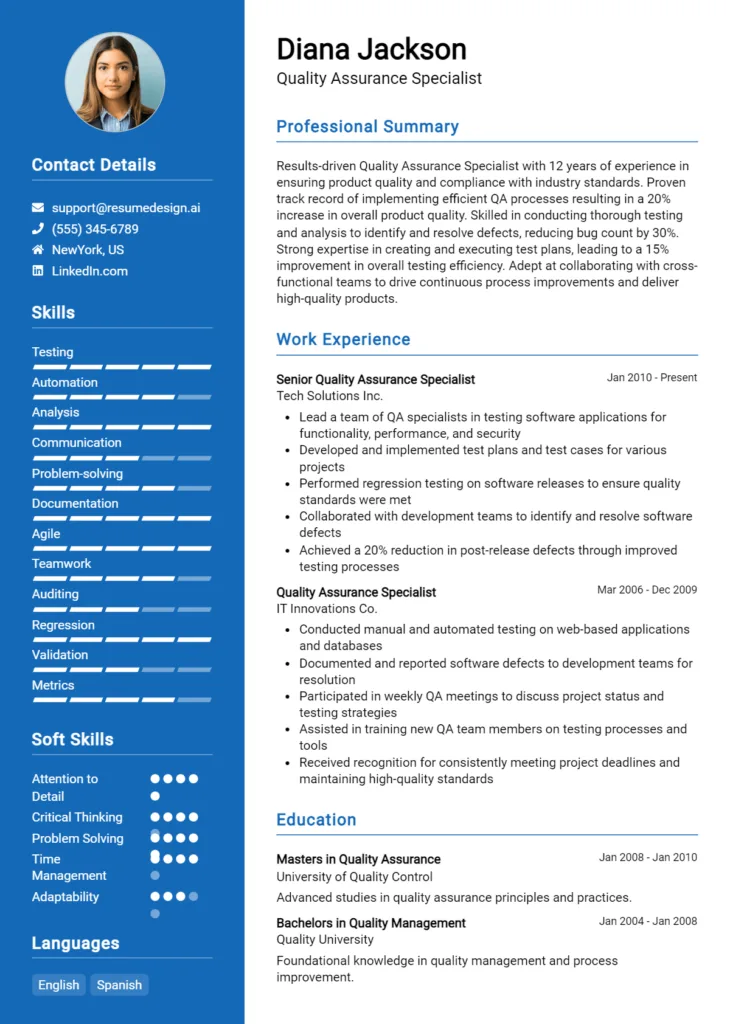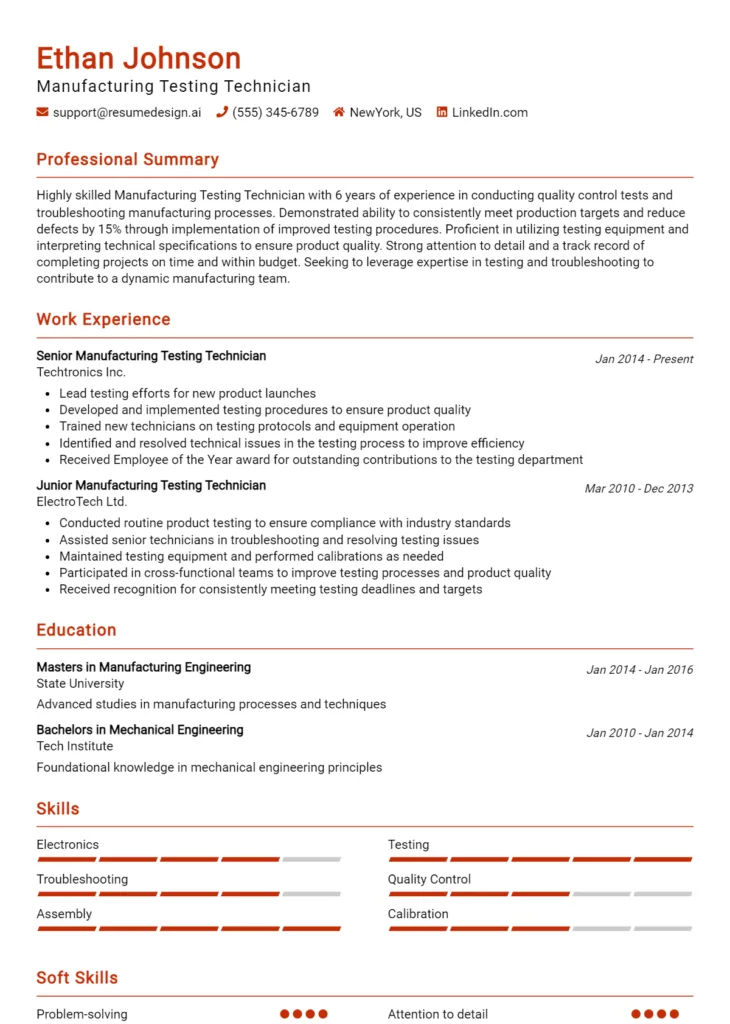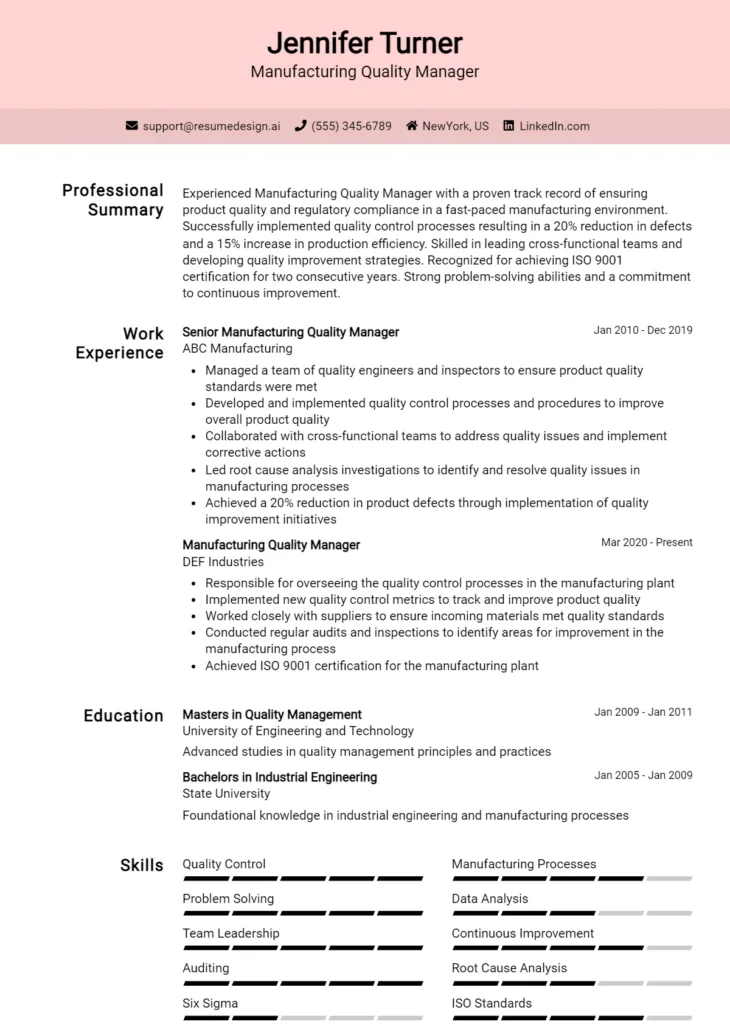Process Quality Engineer Core Responsibilities
A Process Quality Engineer plays a crucial role in ensuring product quality and operational efficiency by bridging various departments such as production, engineering, and quality assurance. Key responsibilities include developing and implementing quality control processes, conducting root cause analysis, and driving continuous improvement initiatives. Technical expertise, operational knowledge, and strong problem-solving skills are essential for success in this role, as they enable effective collaboration across functions. A well-structured resume that highlights these competencies can significantly enhance a candidate's prospects in contributing to the organization's overall goals.
Common Responsibilities Listed on Process Quality Engineer Resume
- Develop and implement quality control plans and procedures
- Conduct root cause analysis and corrective actions for quality issues
- Collaborate with cross-functional teams to enhance process efficiency
- Perform audits and inspections to ensure compliance with quality standards
- Analyze data and metrics to identify trends and improvement areas
- Facilitate training and development sessions on quality practices
- Lead continuous improvement projects using Lean and Six Sigma methodologies
- Document and report quality performance metrics to stakeholders
- Manage quality-related documentation and records
- Support new product development with quality assurance protocols
- Provide technical support for production and operational teams
- Stay updated on industry regulations and quality standards
High-Level Resume Tips for Process Quality Engineer Professionals
In today’s competitive job market, a well-crafted resume is essential for Process Quality Engineer professionals aiming to make a strong first impression on potential employers. Your resume is often the first glimpse hiring managers have of your qualifications, skills, and achievements. It needs to effectively showcase not only your technical expertise but also your ability to contribute to quality improvement and process optimization. This guide will provide practical and actionable resume tips specifically tailored for Process Quality Engineer professionals, helping you to stand out in a crowded field.
Top Resume Tips for Process Quality Engineer Professionals
- Tailor your resume to each job description, using relevant keywords and phrases that match the specific role you are applying for.
- Highlight your relevant experience in process management, quality assurance, and any industry-specific methodologies, such as Six Sigma or Lean.
- Quantify your achievements with metrics, such as percentage improvements in quality, cost savings, or reduced cycle times, to demonstrate your impact.
- Showcase your technical skills, including proficiency in quality tools and software such as Minitab, SPC, or APQP.
- Include any relevant certifications, such as Certified Quality Engineer (CQE) or ISO 9001 Lead Auditor, to enhance your credentials.
- Use action verbs to describe your contributions, such as "developed," "implemented," "led," or "facilitated," to convey a sense of proactivity.
- Focus on results-driven language to emphasize how your work has led to tangible benefits for previous employers.
- Keep the formatting clean and professional, ensuring your contact information is easy to find and your resume is free of errors.
- Consider adding a summary statement at the top of your resume that encapsulates your experience and your commitment to quality engineering.
By implementing these tips, you can significantly increase your chances of landing a job in the Process Quality Engineer field. A polished and targeted resume not only highlights your qualifications but also conveys your dedication to quality and process improvement, making you a compelling candidate for potential employers.
Why Resume Headlines & Titles are Important for Process Quality Engineer
In the competitive field of quality engineering, a well-crafted resume headline is a crucial element that can significantly influence a hiring manager's first impression. For a Process Quality Engineer, a strong headline not only grabs attention but also succinctly encapsulates the candidate's key qualifications and expertise in a single impactful phrase. This brief yet powerful statement serves as a summary that highlights relevant skills, experience, and accomplishments, making it easier for hiring professionals to quickly assess the candidate's fit for the role. A compelling and concise headline ensures that the resume stands out in a crowded applicant pool, reinforcing the candidate's suitability for the position while inviting further exploration of their qualifications.
Best Practices for Crafting Resume Headlines for Process Quality Engineer
- Keep it concise: Limit the headline to a few impactful words that summarize your expertise.
- Be role-specific: Use terminology and keywords specific to the Process Quality Engineer position.
- Highlight key skills: Include essential skills or certifications that are relevant to the job.
- Showcase achievements: If applicable, reference notable accomplishments that demonstrate your effectiveness.
- Avoid generic terms: Steer clear of vague phrases that lack specificity, such as "Experienced Engineer."
- Use action-oriented language: Employ active verbs to convey a sense of capability and proactivity.
- Tailor to the job description: Align your headline with the specific requirements and responsibilities outlined in the job posting.
- Make it engaging: Use compelling language that draws the reader in and piques their interest.
Example Resume Headlines for Process Quality Engineer
Strong Resume Headlines
"Detail-Oriented Process Quality Engineer with 8 Years of Experience in Lean Six Sigma Implementation."
"Certified Quality Engineer Specializing in Root Cause Analysis and Continuous Improvement."
"Results-Driven Process Quality Engineer with Proven Track Record in Reducing Defect Rates by 30%."
Weak Resume Headlines
"Engineer with Some Experience."
"Quality Engineer Looking for Opportunities."
The strong headlines are effective because they provide a clear picture of the candidate's qualifications and expertise directly related to the Process Quality Engineer role. They utilize specific language and quantify achievements, making the candidate memorable and relevant. Conversely, the weak headlines fail to impress due to their vagueness and lack of detail; they do not communicate any specific skills or accomplishments, leaving hiring managers with no compelling reason to consider the candidate further. A strong headline not only captures attention but also sets the tone for the rest of the resume.
Writing an Exceptional Process Quality Engineer Resume Summary
A resume summary is a crucial component for a Process Quality Engineer, as it serves as the first impression a hiring manager will have of a candidate. A well-crafted summary quickly captures attention by succinctly highlighting key skills, relevant experience, and notable accomplishments that align with the job role. It should be concise yet impactful, effectively communicating the candidate's value proposition while being tailored to the specific job they are applying for. This focused approach increases the likelihood of standing out in a competitive job market, making it an essential element of an effective resume.
Best Practices for Writing a Process Quality Engineer Resume Summary
- Quantify Achievements: Use specific numbers to demonstrate your impact, such as percentage improvements in quality metrics or reductions in defects.
- Focus on Skills: Highlight key skills relevant to the role, such as root cause analysis, statistical process control, and quality management systems.
- Tailor for the Job Description: Customize your summary to reflect the specific requirements and responsibilities outlined in the job posting.
- Be Concise: Aim for 2-4 sentences that deliver maximum information without unnecessary fluff.
- Use Action-Oriented Language: Start with strong action verbs to convey your accomplishments and expertise effectively.
- Include Relevant Certifications: Mention any industry-specific certifications or training that enhance your qualifications.
- Showcase Problem-Solving Skills: Highlight your ability to identify issues and implement effective solutions in a timely manner.
- Emphasize Team Collaboration: Indicate your experience working with cross-functional teams to improve quality processes.
Example Process Quality Engineer Resume Summaries
Strong Resume Summaries
Results-driven Process Quality Engineer with over 5 years of experience in manufacturing environments, leading initiatives that reduced defect rates by 30% and improved process efficiency by 25%. Proficient in statistical process control and quality management systems, with a proven ability to drive continuous improvement through data analysis and team collaboration.
Detail-oriented Quality Engineer with extensive experience in automotive manufacturing, successfully implementing quality assurance protocols that enhanced product reliability by 40%. Skilled in root cause analysis and corrective action planning, ensuring compliance with ISO standards while mentoring junior engineers in best practices.
Dedicated Process Quality Engineer with a track record of achieving significant quality improvements, including a 20% reduction in rework costs over 2 years. Expertise in Lean Six Sigma methodologies, complemented by a strong ability to lead cross-functional teams to achieve shared goals.
Weak Resume Summaries
Experienced engineer looking for a quality role where I can apply my skills and knowledge.
Process Quality Engineer with a background in various industries. I aim to help improve processes and ensure quality.
The strong resume summaries are considered effective because they provide specific, quantifiable accomplishments and clearly demonstrate relevant skills and experience tailored to the role. They use precise language and actionable terms, making a compelling case for the candidate's potential. In contrast, the weak summaries are vague and lack detail, failing to convey any significant achievements or specific qualifications, which diminishes their impact in the eyes of hiring managers.
Work Experience Section for Process Quality Engineer Resume
The work experience section of a Process Quality Engineer resume is crucial as it serves as a platform to showcase a candidate's technical skills, leadership qualities, and ability to deliver high-quality products. This section highlights the applicant's practical experience in process improvement, quality assurance, and team management, providing potential employers with concrete evidence of their capabilities. By quantifying achievements and aligning experiences with industry standards, candidates can effectively demonstrate their value and proficiency in enhancing operational efficiency and product quality.
Best Practices for Process Quality Engineer Work Experience
- Use quantifiable metrics to highlight achievements, such as percentage improvements in quality or reductions in defect rates.
- Clearly outline specific technical skills and tools used in past roles, such as Six Sigma, Lean methodologies, or statistical process control.
- Emphasize collaboration with cross-functional teams and how it contributed to project success.
- Tailor descriptions of past experiences to align with the job description and industry standards.
- Include leadership roles and responsibilities to showcase management abilities.
- Focus on problem-solving examples that led to significant process enhancements.
- Highlight certifications and training that validate technical expertise and industry knowledge.
- Use action verbs to convey a proactive approach to quality engineering tasks.
Example Work Experiences for Process Quality Engineer
Strong Experiences
- Led a cross-functional team to implement a new quality management system, resulting in a 30% reduction in product defects over six months.
- Developed and executed a comprehensive training program that improved team compliance with quality standards, achieving a 20% increase in audit scores.
- Implemented Six Sigma methodologies that streamlined production processes, saving the company $150,000 annually in operational costs.
- Collaborated with R&D and manufacturing teams to redesign product specifications, enhancing product reliability and increasing customer satisfaction ratings by 15%.
Weak Experiences
- Worked on quality checks for products.
- Assisted in some process improvement initiatives.
- Helped with team meetings and discussions.
- Participated in quality assurance activities.
The examples classified as strong experiences demonstrate clear, quantifiable achievements and specific contributions to team projects, showcasing the candidate's effectiveness in process quality engineering. In contrast, the weak experiences lack detail and measurable outcomes, offering little insight into the candidate's capabilities or impact within their roles. Strong experiences connect the candidate’s contributions directly to organizational improvements, while weak experiences are vague and fail to illustrate the candidate’s potential value to prospective employers.
Education and Certifications Section for Process Quality Engineer Resume
The education and certifications section of a Process Quality Engineer resume plays a vital role in establishing a candidate's qualifications and expertise in the field. This section not only showcases the academic background of the applicant but also emphasizes their commitment to professional development through industry-relevant certifications and specialized training. By including relevant coursework and certifications, candidates can significantly enhance their credibility and demonstrate their alignment with the specific requirements of the job role. This section acts as a key indicator of the candidate's knowledge base, skills, and dedication to continuous learning in the ever-evolving landscape of quality engineering.
Best Practices for Process Quality Engineer Education and Certifications
- Prioritize relevant degrees in engineering, quality assurance, or related fields.
- Include industry-recognized certifications such as Six Sigma, ASQ Quality Engineer, or ISO Auditor certifications.
- Highlight any specialized training or workshops that are pertinent to the role.
- Detail relevant coursework that aligns with process improvement methodologies and quality control techniques.
- Use clear and specific titles for certifications to enhance recognition.
- Update the section regularly to reflect any new qualifications or professional development activities.
- Consider including honors or awards received during your education to illustrate excellence.
- Maintain a clean and organized format for easy readability for hiring managers.
Example Education and Certifications for Process Quality Engineer
Strong Examples
- Bachelor of Science in Industrial Engineering, University of XYZ, 2020
- Certified Six Sigma Green Belt, American Society for Quality (ASQ), 2021
- ISO 9001:2015 Lead Auditor Certification, Quality Management Institute, 2022
- Relevant Coursework: Statistical Process Control, Quality Management Systems, Lean Manufacturing
Weak Examples
- Associate Degree in Art, Community College of ABC, 2018
- Certification in Basic Computer Skills, Online Learning Platform, 2020
- High School Diploma, Anytown High School, 2016
- Old Certification: Quality Control Fundamentals, 2015 (no longer recognized)
The examples categorized as strong reflect relevant educational qualifications and certifications that are directly applicable to the role of a Process Quality Engineer. They demonstrate a solid foundation in engineering principles, industry-recognized credentials, and pertinent coursework. In contrast, the weak examples lack relevance to the role, showcasing degrees and certifications that do not contribute to the candidate's qualifications for a position in process quality engineering. Including strong examples significantly enhances the candidate's profile, while weak examples may raise questions about their suitability for the role.
Top Skills & Keywords for Process Quality Engineer Resume
As a Process Quality Engineer, showcasing the right skills on your resume is crucial for highlighting your ability to ensure quality standards throughout manufacturing processes. Employers seek candidates who not only possess technical proficiency but also demonstrate strong interpersonal and problem-solving abilities. By effectively articulating both hard and soft skills, you can provide a comprehensive view of your qualifications, making you a standout candidate in a competitive job market. This blend of skills not only reflects your technical expertise but also your capacity to work collaboratively and adapt to dynamic environments, ultimately contributing to the overall success of the organization.
Top Hard & Soft Skills for Process Quality Engineer
Soft Skills
- Attention to Detail
- Analytical Thinking
- Problem-Solving
- Communication Skills
- Team Collaboration
- Adaptability
- Time Management
- Conflict Resolution
- Critical Thinking
- Decision-Making
- Creativity
- Leadership
- Interpersonal Skills
- Customer-Focused Mindset
- Continuous Improvement Orientation
Hard Skills
- Statistical Process Control (SPC)
- Six Sigma Methodologies
- Quality Management Systems (QMS)
- Root Cause Analysis (RCA)
- Failure Mode and Effects Analysis (FMEA)
- ISO 9001 Standards
- Lean Manufacturing Principles
- Process Mapping and Analysis
- Data Analysis Software (e.g., Minitab, JMP)
- Quality Auditing Techniques
- Design of Experiments (DOE)
- Technical Documentation Skills
- Regulatory Compliance Knowledge
- Risk Management
- Manufacturing Process Knowledge
- Product Inspection Techniques
- Equipment Calibration and Maintenance
By integrating these skills into your resume, along with your work experience, you can effectively demonstrate your competencies and readiness to tackle the challenges of a Process Quality Engineer role.
Stand Out with a Winning Process Quality Engineer Cover Letter
Dear Hiring Manager,
I am writing to express my interest in the Process Quality Engineer position at [Company Name], as advertised on [Job Board/Company Website]. With a strong background in quality engineering and a proven track record of improving manufacturing processes, I am excited about the opportunity to contribute to your team. My hands-on experience in implementing quality control measures and my dedication to maintaining high standards of excellence align perfectly with the goals of your organization.
In my previous role at [Previous Company Name], I successfully led several process improvement initiatives that resulted in a 25% reduction in defects and a significant increase in overall product quality. I utilized root cause analysis and statistical process control techniques to identify areas for improvement and implemented corrective actions that not only enhanced product reliability but also optimized production efficiency. My ability to collaborate with cross-functional teams and communicate effectively with stakeholders has been instrumental in driving these successful outcomes.
I am particularly drawn to the innovative approach at [Company Name] and your commitment to continuous improvement. I am eager to bring my expertise in quality assurance methodologies, along with my strong analytical skills and attention to detail, to help elevate your quality processes. I am confident that my proactive approach and passion for quality engineering will make a positive impact on your team.
Thank you for considering my application. I look forward to the opportunity to discuss how my background, skills, and enthusiasms will be a great fit for the Process Quality Engineer role at [Company Name]. I am excited about the possibility of contributing to your esteemed company and am available at your earliest convenience for an interview.
Sincerely,
[Your Name]
[Your Phone Number]
[Your Email Address]
Common Mistakes to Avoid in a Process Quality Engineer Resume
When crafting a resume for a Process Quality Engineer position, it's crucial to present your qualifications and experience effectively. However, many candidates make common mistakes that can hinder their chances of getting noticed by hiring managers. Understanding these pitfalls can help you create a more compelling and targeted resume that highlights your strengths in quality engineering. Here are some common mistakes to avoid:
Generic Objective Statement: Using a vague objective that doesn't align with the specific role can make your resume feel unfocused. Tailor your objective to reflect your interest in the company and position.
Failure to Quantify Achievements: Listing responsibilities without quantifying achievements can diminish your impact. Use numbers and percentages to demonstrate how you improved processes or reduced defects.
Overloading with Technical Jargon: While technical expertise is essential, excessive jargon can confuse hiring managers. Balance technical terms with clear explanations to ensure your value is easily understood.
Lack of Relevant Keywords: Not incorporating keywords from the job description can result in your resume being overlooked by Applicant Tracking Systems (ATS). Analyze the job posting and weave in relevant terms throughout your resume.
Ignoring Soft Skills: Focusing solely on technical skills may overlook the importance of soft skills in quality engineering. Highlight attributes like teamwork, communication, and problem-solving that are essential for collaboration.
Inconsistent Formatting: A resume that lacks a clean, consistent format can be difficult to read. Use uniform fonts, bullet points, and headings to enhance readability and professionalism.
Omitting Certifications and Training: Failing to include relevant certifications or training can underrepresent your qualifications. Make sure to list any industry-standard certifications, such as Six Sigma or Lean Manufacturing.
Neglecting to Customize for Each Application: Sending out a one-size-fits-all resume can be detrimental. Take the time to tailor your resume for each application, addressing specific requirements and responsibilities mentioned in the job description.
Conclusion
As a Process Quality Engineer, your role is pivotal in ensuring that manufacturing processes meet stringent quality standards, thereby enhancing overall efficiency and customer satisfaction. Throughout this article, we explored the critical skills and qualifications necessary for success in this field, including problem-solving abilities, a strong understanding of quality control methodologies, and familiarity with industry standards such as ISO and Six Sigma.
Additionally, we highlighted the importance of effective communication and collaboration with cross-functional teams to drive continuous improvement initiatives. Emphasizing data analysis and the ability to utilize various quality tools are also essential aspects of the Process Quality Engineer's responsibilities.
In conclusion, as you strive to advance in your career, it’s crucial to present a polished and professional resume that showcases your expertise. We encourage you to review your Process Quality Engineer resume and ensure it reflects your skills and achievements accurately. To assist you in this process, a variety of resources are available, including resume templates, a comprehensive resume builder, curated resume examples, and cover letter templates. Take the next step in your career by utilizing these tools to create a standout application!

